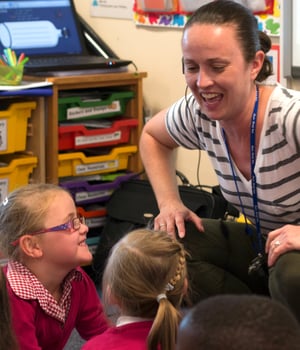Gradeless lesson observations: more fertile ground for a growth mindset?
A study from Ruth Butlers indicates that feedback with no grade leads to better student outcomes than when you provide just a grade or both feedback and a grade.
Grades are "ego-involving", they lead students to focus only on achieving a level of performance rather than on what they can do to improve. An A* student has achieved the ultimate grade...but does that mean they can stop learning? Does that mean they have reached their full potential and can't be stretched further?
Has a teacher reached the pinnacle of teaching because someone observed a lesson and judged them as Outstanding? Is there nothing they can do to provide even better learning experience for young people? John Tomsett has written eloquently about this in a number of blogs, his most recent is about "trying to improve my teaching deliberately".

Accountability, professionalism and innovation
Carol Dweck’s theory of the Growth Mindset hinges around the importance of focusing on and praising the process of learning, not the outcomes.
But...
...focusing on the process of learning is hard when you work in a system that's so fixated on outcomes.
Accountability and results are important, after all in the state education system it’s public money and young people’s futures at stake. But, there needs to be an intelligent approach to accountability and measuring outcomes if we are to develop a system wide growth mindset.
The Finnish system is built on internal accountability to the profession and not to an external body. There is much to admire in the Finnish system but to me, what blazes through is trust in the professionalism of teachers. Talking of the Finnish system, Laukkanen (2008) noted that
“Empowerment of the teaching profession produces good results. Professional teachers should always have space for innovation ...”
A culture of fear?
The Guardian have recently reported on a new discussion paper written by Brian Lightman (General Secretary of the ASCL). In the paper, he addresses some of the challenges facing the English school system, confusion about Ofsted inspections and discusses "a culture of fear around inspection which hampers innovation and sensible risk taking".
With Ofsted's recent renouncement of grading individual lessons, will there be less fear surrounding lesson observation? Will this open the doors for more innovation in teaching, a willingness to experiment in a more supportive environment without fear of judgement?
Purposeful professional development
What really makes a difference to the quality of teaching and learning is purposeful professional development.
Through purposeful professional development the brain grows and develops, building neural pathways that make something that once had to be very deliberate become part of what you do day to day. Part of becoming great at what you do is about being willing to make mistakes without fear of being branded as "requiring improvement".
Hopefully the move away from grading individual lessons will help change the culture of observation. Observation should be about inviting colleagues to see the great things happening in your classroom, feedback and discussion around an agreed focus and setting objectives for making improvements next time. Not about telling you which box you tick.
Research by Professor Christina Preston has shown that observation and self reflection can actually empower teachers. Her research showed that 96% of teachers using IRIS Connect were more confident to try new things or be very experimental with their teaching.



Leave a comment:
Get blog notifications
Keep up to date with our latest professional learning blogs.